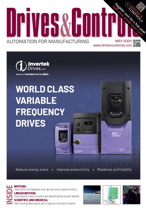- Home » News » Technology News
Fourth-gen DTC promises better speed and torque control

ABB has announced a fourth generation of its direct torque control (DTC) motor control platform, with the claim that it will bring more accuracte motor speed and torque control, as well as the ability to control more types of motor.
The technology, which ABB has been using in its variable-speed drives (VSDs) since 1996, is said to offer enhanced performance in open- and closed-loop applications as well as higher switching frequencies. Speed and torque control accuracy have been improved, for both dynamic and static values.
High-speed motors (up to 500Hz) are now supported, and there is also support for absolute encoders and resolvers. Other improvements include a greater choice of identification set-up runs, such as accurate standstill runs, which allow the drive to identify a motor from its performance characteristics without needing to uncouple the motor from its load.
Drives equipped with the new DTC can respond to changes in speed references much more quickly, with the motor shaft responding within 2ms of a reference change, rather than 10ms.
ABBs latest industrial drive, the ACS880, is equipped with the new version of DTC, and can control any motor type – including squirrel cage, permanent magnet and ABB’s high-efficiency synchronous reluctance (SynRM) motors – without any firmware changes.
The ACS880 offers scalar control with its own ramps and fixed- and skip-speeds. This is useful in multi-motor applications and can help to test installations before switching to DTC. ABB says that this is particularly useful when the test motor is a different size from the one to be used on site.
DTC can achieve field orientation without feedback, using motor theory to calculate the motor torque. It is said to use the fastest digital signal processing hardware available and a more advanced mathematical understanding of how motors work. The result is a drive with a torque response that, ABB claims, is typically ten times faster than other AC or DC drives. This gives much improved process control and a more consistent product quality. The company adds that the dynamic speed accuracy of DTC drives is eight times better than any open-loop AC drive and is comparable to a DC drive using feedback.

Although DTC avoids the need for speed feedback devices, accuracy can be improved further in some applications by using encoders, resolvers or tachometers. The ACS880 drives have option slots that allow these items to be fitted internally, making installation convenient and cheaper.
DTC was developed originally to optimise control of induction motors and has now been extended to other industrial motors. It can generate full torque at zero speed on standard induction motors, and can be applied to highly dynamic or arduous applications.
High dynamic torque control means that DTC-equipped drives can handle applications such as grinders and crushers, while the ability to generate torque at low speeds means that they can also control mixers or start fully-loaded conveyors. DTC can be operated in master-follower modes, making winders and strip lines easier to control, as well as cross-travel or long-travel crane control.





